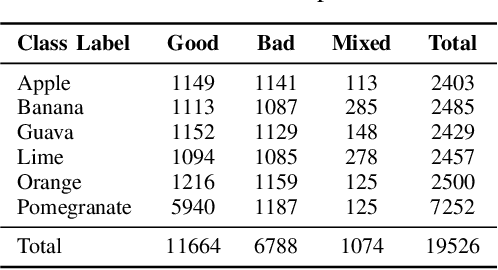Muhammad Usama Islam
Fruit Quality Assessment with Densely Connected Convolutional Neural Network
Dec 08, 2022



Abstract:Accurate recognition of food items along with quality assessment is of paramount importance in the agricultural industry. Such automated systems can speed up the wheel of the food processing sector and save tons of manual labor. In this connection, the recent advancement of Deep learning-based architectures has introduced a wide variety of solutions offering remarkable performance in several classification tasks. In this work, we have exploited the concept of Densely Connected Convolutional Neural Networks (DenseNets) for fruit quality assessment. The feature propagation towards the deeper layers has enabled the network to tackle the vanishing gradient problems and ensured the reuse of features to learn meaningful insights. Evaluating on a dataset of 19,526 images containing six fruits having three quality grades for each, the proposed pipeline achieved a remarkable accuracy of 99.67%. The robustness of the model was further tested for fruit classification and quality assessment tasks where the model produced a similar performance, which makes it suitable for real-life applications.
Towards technological adaptation of advanced farming through AI, IoT, and Robotics: A Comprehensive overview
Feb 21, 2022



Abstract:The population explosion of the 21st century has adversely affected the natural resources with restricted availability of cultivable land, increased average temperatures due to global warming, and carbon footprint resulting in a drastic increase in floods as well as droughts thus making food security significant anxiety for most countries. The traditional methods were no longer sufficient which paved the way for technological ascents such as a substantial rise in Artificial Intelligence (AI), Internet of Things (IoT), as well as Robotics that provides high productivity, functional efficiency, flexibility, cost-effectiveness in the domain of agriculture. AI, IoT, and Robotics-based devices and methods have produced new paradigms and opportunities in agriculture. AI's existing approaches are soil management, crop diseases identification, weed identification, and management in collaboration with IoT devices. IoT has utilized automatic agricultural operations and real-time monitoring with few personnel employed in real-time. The major existing applications of agricultural robotics are for the function of soil preparation, planting, monitoring, harvesting, and storage. In this paper, researchers have explored a comprehensive overview of recent implementation, scopes, opportunities, challenges, limitations, and future research instructions of AI, IoT, and Robotics based methodology in the agriculture sector.
 Add to Chrome
Add to Chrome Add to Firefox
Add to Firefox Add to Edge
Add to Edge